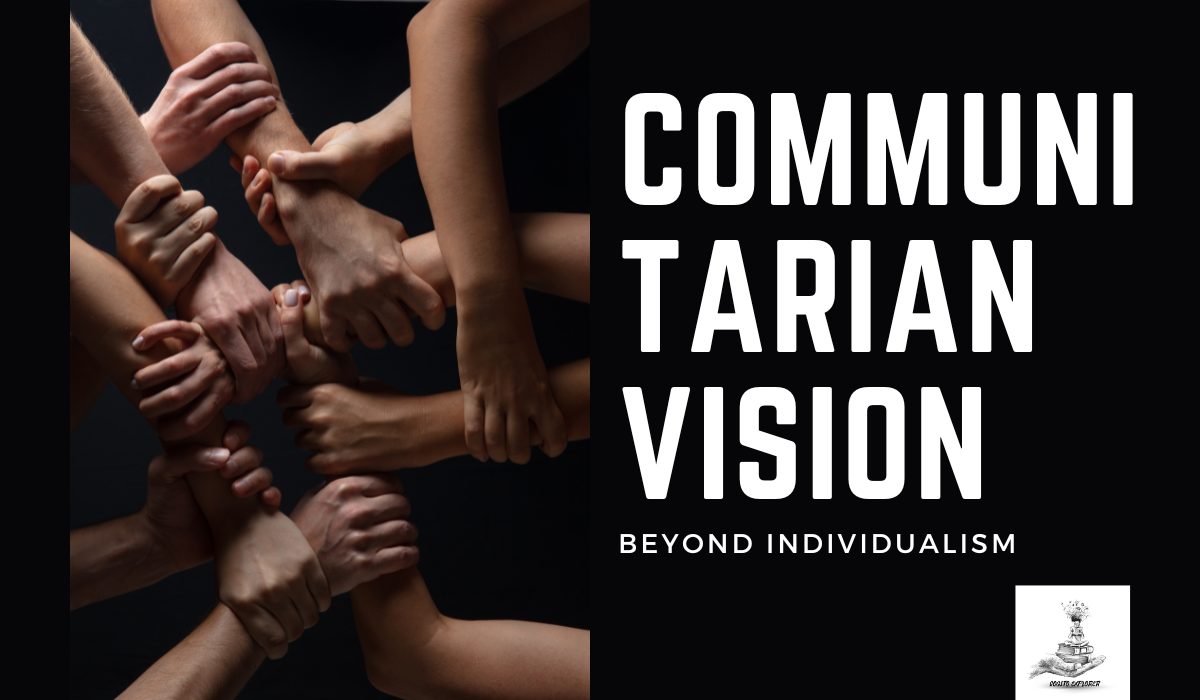Communitarianism: Beyond Individualism
A community is a social group of people who share common characteristics, interests, or goals and who are connected by social, economic, cultural, or geographical ties. Communities can vary widely in size, structure, and nature and play a fundamental role in shaping human societies. The concept of a community can encompass various levels, from small, tightly-knit groups to large, geographically dispersed populations.

Today we are going to discuss a philosophical stance or political theory. That emphasizes the importance of community and social relationships in shaping individual identity, values, and well-being. Communitarianism highlights the significance of collective well-being and responsibility and stands in contrast to individualistic ideologies that prioritize personal autonomy and rights.
Community as the Basis of Identity:
Communitarianism asserts that individuals are not isolated entities but are deeply embedded in and shaped by the communities to which they belong, such as family, culture, and society.
It contends that individuals are inherently social beings, and their identities and values are formed within the context of their communities. The personal identity is not merely an autonomous construct but is deeply influenced by relationships, cultural norms, and communal experience. That shapes an individual’s sense of self. Thus identity, according to communitarian thought, is not solely a product of individual choices. But is also influenced by the shared values, traditions, and norms of the community.
Common Good and Shared Values:
Communitarianism emphasizes the pursuit of the common good over individual interests. It seeks a balance between individual rights and social obligations. While acknowledging the importance of personal freedoms, it underscores the idea that individuals have responsibilities to their communities. Thus argues that communities should establish and uphold shared values that contribute to the well-being of all members. The decision-making and ethical considerations within a community should be guided by a collective understanding of what is beneficial for the community as a whole. The concept suggests that a healthy and just society involves individuals recognizing their duty to contribute to the common good. Considering the impact of their actions on the broader community.
Critique of Excessive Individualism:
Communitarians critique extreme forms of individualism that prioritize personal autonomy and rights without considering the impact on the larger community. The extreme focus on personal autonomy, isolated self-interest, and overemphasis on individual rights can lead to social fragmentation. This perspective argues against viewing individuals as completely independent actors and highlights the need for a balance between individual rights and responsibilities toward the community. Thus a more balanced approach, considering the needs and values of the community, is essential for a cohesive and flourishing society.
Role of Institutions and Traditions (Culture):
Communitarianism acknowledges the role of institutions (such as family, religious organizations, and educational systems) and traditions in shaping and maintaining the fabric of a community. Institutions serve as guardians of the community’s shared values. Providing a framework for social interactions and reinforcing cultural principles. The cultural identity within communities, cultural traditions, and shared values contribute to a sense of belonging and continuity for individuals. It values the stability provided by established social structures. Institutions and traditions are seen as repositories of wisdom and sources of social cohesion. Contributing to the well-being of individuals within the community.
Social Justice and Responsiveness:
Communitarianism is concerned with social justice and argues that policies and institutions should be responsive to the needs and values of the community. It emphasizes the importance of fair distribution of resources, opportunities, and benefits within a community. Social and economic structures should be designed to address systemic inequalities which ensures that all members have access to essential resources and opportunities. Thus enhancing the overall welfare of the community and promoting a more just society. The community is viewed as an active agent in promoting social justice and collective action is seen as essential for addressing systemic issues and fostering an inclusive society.
Community Participation and Civic Engagement:
Communitarianism values active participation in community life and civic engagement. It emphasizes the importance of individuals contributing to the well-being of their communities. Educational systems, according to communitarian thought, should not only impart academic knowledge but also foster a sense of civic responsibility, and ethical behavior. And also an understanding of the importance of community participation. Active involvement in community affairs is seen as a way to strengthen social bonds, foster a sense of responsibility, and contribute to the common good. Active participation involves individuals taking an interest in community affairs. Contributing their skills, and engaging in collaborative efforts to address common issues. It emphasizes the idea that a thriving community requires the active involvement of its members. Civic engagement encompasses various activities, including voting, community organizing, volunteering, and participating in public discourse.
Balancing Individual Rights and Social Responsibilities:
Communitarianism advocates for a balance between individual rights (that include personal liberties, autonomy, and the pursuit of one’s interests and goals) and social responsibilities.
It often incorporates an ethics of reciprocity (a sense of mutual obligation) suggesting that individuals. Enjoying their rights should be reciprocated by fulfilling social responsibilities. While recognizing individual freedoms, it emphasizes the importance of considering the impact of one’s actions on the community i.e. autonomy is valued but isn’t absolute and should be exercised in consideration of the broader community. Communitarians argue that personal freedoms should be exercised responsibly. This perspective encourages ethical decision-making that takes into account the broader context of community well-being.
Cultural Pluralism and Diversity:
Communitarianism recognizes and values cultural pluralism within societies. It appreciates the diversity of communities and encourages mutual respect among different cultural groups. Rather than seeking a homogenous society, communitarianism supports the coexistence of diverse communities. Each contributes to the overall richness of the larger social fabric fostering an inclusive and vibrant community. Diverse cultural perspectives bring a variety of ideas, values, and practices to the community. Communitarians argue that embracing this diversity is seen as essential for creating dynamic and resilient communities. By valuing and preserving cultural diversity, communitarians aim to build inclusive societies that respect the unique contributions of each cultural group while fostering shared values that promote unity amid differences.
Conclusion:
Communitarianism, as a philosophical framework, provides a holistic perspective on human society by emphasizing the importance of community. Also shared values, and social interconnectedness in shaping a just and fulfilling life. It advocates the embeddedness of individuals in their social context and the pursuit of the common good. Communitarianism values institutions, traditions, and cultural pluralism which can play a crucial role in promoting social justice. Enhancing civic engagement, and driving individual thoughts toward a balanced approach between personal rights and collective responsibilities toward society as a whole.







